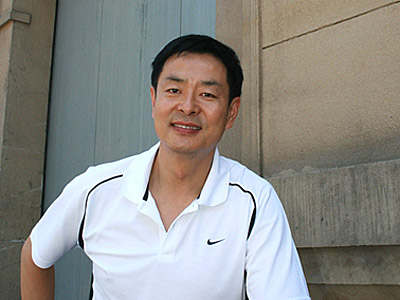
The year 2007 marks the 100th anniversary of the birth of modern Chinese drama, and the 55th anniversary of the founding of the Beijing People's Art Theatre (BPAT). The BPAT, which has been honored as an "actor's paradise" since the 1950s, is scheduled to present twenty-two dramas, including The Butcher, and The Assassin, to celebrate the historic moment.
In an exclusive interview with Beijing Review, Pu Cunxin, a renowned veteran drama actor with the BPAT, speaks about his love for theatre and expresses his undying solidarity towards this ancient art form.
Beijing Review: As a veteran drama actor who has been active on stage since the 1980s, you have essayed a range of characters--from Li Bai in Li Bai to Master Chang in The Teahouse--many of which have won you immense popularity with Chinese audiences. The total number of performances by you has exceeded a thousand, and you were awarded the title of "one of the most distinguished drama actors in China" in April. What fascinates you about drama rather than TV series/movies?
Pu Cunxin: Drama acting is a process during which you can make breakthroughs as long as you maintain a degree of self-criticism and never feel self-contentment. I can feel the gradual progress of my acting during rehearsals, from immature to mature. At the same time, I learn from other actors' acting highlights, which in turn are good for performance.
The glamour of drama, in my opinion, is rooted in the infinite possibilities of creation; the unpredictability of the stage is the most powerful lure for every drama player. There are tremendous famous classical works you can enjoy in the drama world. These works, written by Shakespeare, Lao She, Cao Yu, etc. have the most beautiful words rhetorically, that touch your heart and reach your soul.
Actually, drama acting is so different from TV/movie acting. There is no time and room for repeated rehearsals when you shoot for TV/ movies; the actor should be good at adjusting and readjusting himself/herself to what the director or cameraman requires. As for a drama actor, he can, by contrast, adjust to new scenarios during rehearsals, follow the direction the drama sets, and then present it to the audience. We keep up this process of self-examination and go even further after the premiere.
I am blessed to be a member of the BPAT. I am able to meet with and learn from senior veteran actors, whether on stage or not. It is the most valuable experience in my life. For example, I still remembered the burning enthusiasm and serious attitude sparked in Zheng Rong's eyes during our rehearsals of The Thunderstorm some 10 years ago. I was deeply moved by then 70ish Mr. Zheng. In short, I consider myself very lucky to have chosen drama.
The BPAT took the play The Teahouse to Washington D.C., New York, Houston and Los Angeles in 2005. This is widely regarded as the move that opened the door for other Chinese drama players to perform overseas. What are your impressions on what happened, since you were one of the lead actors?
It was a momentous occasion for us, the long-standing drama group in China, to introduce modern Chinese drama by prestigious playwright Lao She to the Americans, especially to the overseas Chinese audience. In the West, it is rare to see drama teams with a staff of more than 60 going on tour under market-driven conditions. But here in China, the West's "mission impossible" becomes "possible", for we are supported and funded by the country.
I was deeply impressed and moved by what happened during the performance tour. Mr. Peter Cross, the Chairman of the Board of Directors of the Alliance of Resident Theatres/New York, invited us to dine at the Rockefeller Center revolving restaurant. He told us that he saw the The Teahouse upon returning from a business trip, and would definitely see it again.His enthusiasm for the play was genuine. Another example is a radio call-in program I attended in Washington D.C.. One of the callers was an elderly non-resident Chinese. He said that he couldn't help but cry after seeing such a stunning Chinese drama performance in the United States. He had immigrated to the States when he was young, with a vision of the American Dream. But now, a Chinese Dream has replaced the American Dream for him, as everything has settled down and he's growing old.
|
